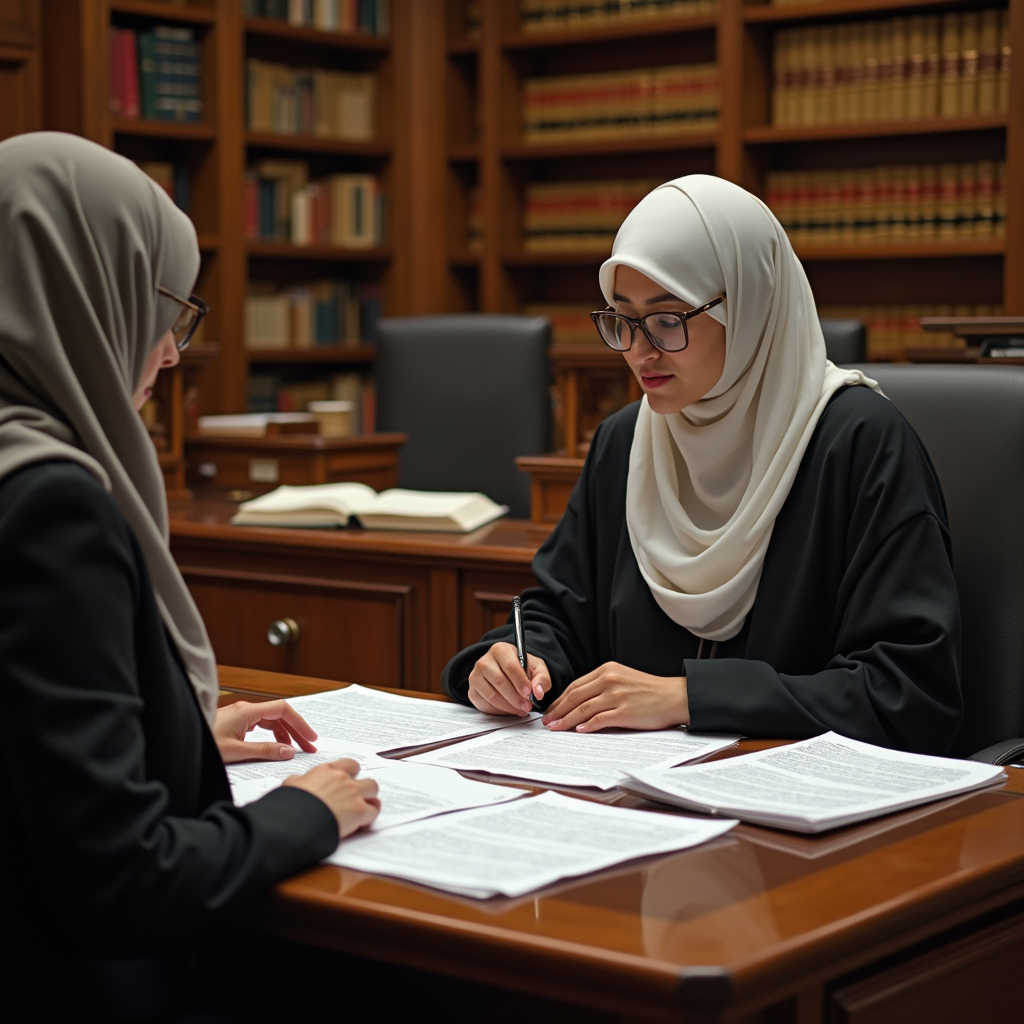This article is written by Mehak. This article aims to illustrate the notion of talaq-e-tafweez and focus on the concept, its nature and scope, and the types of talaq-e-tafweez. This article further emphasises the agreements with respect to talaq-e-tafweez. This article also covers the relevant case laws and their judicial interpretations of talaq-e-tafweez along with some related FAQs.
Table of Contents
Introduction
Talaq or divorce is the dissolution of marriage between the parties, where all the rights and obligations that exist between the parties come to an end. Divorce is regulated as per the specific provisions mentioned under the personal law applicable to the individual. Under Muslim law, the dissolution of marriage can take place either by the death of the either party or by the divorce between the parties.
Divorce under Muslim law, can be judicial or extra-judicial in nature and are valid and recognised. Judicial Divorce is given by the judicial decree of the Court as per the provisions of the Dissolution of Muslim Marriage Act, 1939. Whereas, extra- judicial divorce can be given either by mutual consent, by husband or by wife. Divorce by mutual consent is further divided into two types: Khula and Mubarat, where the husband can divorce his husband via three modes: Talaq, Ila, and Zihar. It also recognises the divorce pronounced by the wife. A wife can dissolve the marital ties with the right and power of talaq-e-tafweez.
Talaq-e-tafweez is one of the ways by which she gets the power to divorce her husband. It is a sort of agreement that can be entered before or after the marriage, where the husband delegates his power of divorce to his wife in order to exercise it in specified reasonable conditions. This delegation of power can be given permanently, temporarily, conditionally, or unconditionally. Such divorce shall not make it any less divorce. It shall have the same effect as if it was made by the husband.
Let us delve into this delegated power of divorce right, that is, talaq-e-tafweez and understand it in detail.
Women’s power to divorce
By Dissolution of Muslim Marriage Act, 1939
A Muslim wife is entitled to seek a decree of divorce from the Court as per the grounds mentioned under Section 2 of the Dissolution of Muslim Marriage Act, 1939, i.e., in cases where the whereabouts of the husband are not known from the past four years, failed to provide maintenance, has been sentenced to an imprisonment for seven years or more, if the husband is impotent, insane or have any venereal disease, etc. The woman can grant the divorce if it falls under any of the grounds specifically provided.
By Mutual Consent
Divorce by mutual consent can be made in two ways:
- Khula
Khula in a literal sense means “to lay down” or “to take off clothes”. In legal terms, it means laying down one’s authority over his wife. A Divorce by Khula is on a consensual basis only but is initiated on the instance of the wife, against which she gives or agrees to give consideration to her husband. The consideration is given by the wife in exchange for dissolving marital ties with her.
- Mubarat
Mubarat means “release”, i.e., to release each other from marital ties. Under Mubarat, the divorce takes place with the mutual consent of both the parties. The parties must be of sound mind and should have attained the puberty age in order to get their marriage dissolved by mubarat.
Recently, in the case Shabnam Parveen Ahmad vs. Nil (2024), the Karnataka High Court allowed the appeal whereby the parties approached the Court against the orders of the Family Court. The Family Court thereby dismissed the suit stating that the parties mutually seeking the decree of divorce as per the Muslim rites and covenants of Mubarat deed is not contemplated under the provisions of the Dissolution of Marriage Act, 1937. The appellant in the appeal contended that Mubarat agreement is to be accepted by the Family Court when the Dissolution of Marriages Act, 1937, and the Muslim Personal Law (Shariat) Application Act, 1939 are read with Section 7 of the Family Courts, 1984. The High Court pursuing the appellant’s contentions held that the Family Court’s interpretation of to Mubarat agreement was the incorrect proposition of law and further declared that the marriage between the parties was to be dissolved as per the Mubarat deed.
By Delegated Divorce
Delegated Divorce or Talaq-e-tafweez is a mode of divorce under which the husband gives her power to divorce to his wife under certain contingencies. Wife by exercising her power can divorce herself and it shall have the same effect as it is pronounced by the husband. However, authorising power to divorce does not deprive the husband’s right to divorce. It is recognised under both the Shias and Sunnis laws.

Concept of Talaq-e-tafweez
Meaning of Talaq-e-tafweez
Talaq-e-tafweez, where tawfeez means “delegate”, is also referred to as Talaq-i-tawhid or delegated divorce. It is a type of talaq, where the husband delegates the powers to his wife or other person to pronounce divorce under specified conditions. However, delegating powers does not deprive the rights and power of the husband to divorce. This delegation of power can only be done by her husband and is recognised under both the Shias and the Sunnis laws. He may delegate this power absolutely, temporarily, permanently, or conditionally. However, a permanent delegation of power is revocable but a temporary delegation given for a specified period is not revocable.
Nature and scope of Talaq-e-tafweez
Talaq-e-tafweez is basically an agreement made before or after the marriage stating that the wife has the power to divorce the husband under the specified conditions mentioned under the agreement. Provided that, the conditions under the agreement must be reasonable to account for separation via divorce. The reasonable conditions to get separated could be –
- Husband marrying a second wife.
- Husband not maintaining her wife or providing her with basic facilities.
- Any other conditions that are not opposed to public policy.
And if the husband does any act which comes under the conditions mentioned in the agreement, then the wife has full authority to pronounce talaq. In such a way, she can get separated from her husband and dissolve her marital ties. However, if the husband does any act fulfilling the conditions under the agreement it does not automatically result in the divorce. The exercising of power depends upon the wife, whether she wants to divorce her husband or not.
Discretion of wife to exercise power
Under the agreement, there are stipulations mentioned by the parties stating that if the husband acts upon any such stipulation, a woman may enforce her right to divorce. It is to be noted that the happening of such contingency, does not by itself lead to divorce. This does not act as an automated divorce. Happening of any contingency gives power to the wife to divorce, not result in a divorce. It’s upon the discretion of the wife to pronounce talaq on the occurrence of such contingency. Therefore, to dissolve the marital relations, the wife has to exercise her powers.
Types of Talaq-e-tafweez
Talaq-e-tafweez is further classified into three types which are as follows –

- Ikhtiyar (Choice) – Ikhtiyar is one of the types of talaq-e-tafweez. Under this, the husband vests power and authority onto the wife to pronounce and initiate the talaq whenever it seems reasonable. It means that the husband gave his wife a choice to cut off marital obligations. The wife can only use this choice to divorce under certain conditions that seem reasonable. However, such delegation can be for a day or a certain period of time, it’s at the discretion of the husband.
- Amr-bi-ya (Liberty) – Under this, the decision as to talaq is solely determined by the wife. The wife shall be responsible for the dissolution of the marriage. The wife has the liberty or freedom to entertain or initiate the divorce, i.e., whether to divorce the husband or not.
- Mashiyat (Pleasure) – Mashiyat is a type of talaq under which the husband gives his wife an option to exercise talaq. Under this, the wife has the freedom to initiate talaq upon his will. This type of talaq can be unconditional or may be subject to certain contingencies/ conditions. Non-fulfillment of conditions shall be sufficient reason for a wife to divorce herself and get herself free from the marital tie. The divorce takes place as it is pronounced by the husband and has the same effect.
Like, in the case of Sainuddin vs. Latifannessa Bibi (1918), the husband and wife made an agreement under which the husband gave power to his wife to pronounce triple talaq under certain conditions. The husband married to the second wife without the permission of his wife which falls under the condition to exercise the power of talaq. However, the first wife untied herself from marital obligations by pronouncing three talaqs. The Court held that the divorce is completely valid and effective as per Muslim laws.
Pre-nuptial and post-marriage agreements
Prenuptial agreements
Prenuptial agreements are the agreements that are entered into by the parties before or at the time of the marriage. In relation to Talaq-e-tafweez, the parties before or at the time of marriage specifically mention conditions as to which a wife can use his power to pronounce the divorce. Such contracts also outline the husband’s responsibilities and duties towards his wife and mere non-fulfillment could be a valid reason for the wife to exercise his right of talaq.
For instance, in the case of Mohd. Khan vs. Mst. Shahmai, (1972), a husband who was Khana Damad, under a prenuptial agreement undertook to pay a certain amount of marriage expenses incurred by father-in-law if leaving the father-in-law’s house and thereby conferred power on the wife to pronounce talaq on non-fulfillment. The husband left his house without paying a specified amount stipulated in the agreement. The wife, therefore, exercised her power and divorced herself. In the case, it was held that a woman divorced herself by exercising the power delegated to her and hence, is a valid divorce.
Post-nuptial agreements
Post-nuptial agreements or post-marriage agreements, on the other hand, are agreements where spouses set out the rights and responsibilities each spouse has during the marriage. It also outlines the financial assets one spouse will acquire after the event of divorce. In relation to Talaq-e-tafweez, the spouses enter into a contract where they set out the conditions that if the husband fulfils any of these conditions stipulated, the wife has the authority to divorce herself and get separated. Such contracts can be temporary or permanent in nature. However, permanent contracts are revocable whereas temporary contracts made for a specified time, once made cannot be revoked.
Delegation of power
Delegation of power is the main aspect of talaq-e-tafweez, where the husband delegates his authority to divorce. Under this, the husband gives the right to women to divorce and get separated from marital relations under specified conditions. This power is given through an agreement, stipulating conditions, and the nature of the agreement.
Time and effect of delegation
Time of delegation
The delegation of power to pronounce talaq can be given –
- at any time prior to the marriage
- During the marriage or
- subsequent to the marriage
Delegation of power shall be considered perfectly valid at any time, either before the marriage, at the time of the marriage, or after entering into marriage. Every delegation shall have the same effect. However, the agreement as to the delegation of power entered prior to the marriage shall take into effect only after the marriage and shall not be binding upon the husband before the marriage of the parties.
Effect of delegation

The effect of delegation shall be that the wife shall act as a representative of her husband to pronounce talaq on his behalf. By delegation of power, her husband authorised her to dissolve the marriage but under specified conditions that are reasonable and are not opposed to public policy. The Talaq shall be deemed as it is made or pronounced by the husband only and shall have the same effect. The power of divorce to women is irrevocable if given for temporary or specified conditions but can be revocable if given permanently or unconditionally.
Eligibility to delegate the right of divorce
The husband can only delegate his right of divorce when he falls under the following conditions –
- The husband should be of sound mind.
- He should have attained the age of majority.
He has the absolute and unrestricted right to divorce.
Case laws and judicial interpretations surrounding Talaq-e-tafweez
Hamidoolla vs. Faizunnissa (1882)
Facts
In Hamidoolla vs. Faizunnissa (1882), the plaintiff, i.e., husband, and defendant, i.e., the wife had entered into an agreement (kabinnama) before their marriage, according to which she has the right to divorce her husband on the happening of certain contingencies such as, to allow to visit her father’s home four times a year, not to ill-treat her. The defendant therefore as per agreement conditions divorced herself on being ill-treated by her husband and on refusing to pay dowar money. Thereafter, the plaintiff filed restitution of conjugal rights against his wife.
Issues
Whether the divorce made by the defendant is contrary to Mohammedan law or not?
Contentions by Plaintiff
The Counsel for Plaintiff, Munshi Serajul Islam in the appeal contended that the delegation of power to divorce her husband is violative and contrary to Mohammedan law and therefore the divorce pronounced by the wife to her husband is invalid and does not dissolve the marital tie between them.
Judgement
The Calcutta High Court in this case held that the divorce made by the wife is not opposed to the policy of Mohammedan law and the divorce pronounced by her on behalf of her husband is completely valid. The Court stated that there are no findings based on the authority that prove the contentions of the plaintiff and further laid down that the Mohammedan law gives the husband to delegate its power to divorce to his wife on certain occasions. And, in the present case, the divorce made by the wife falls under certain conditions and so the power exercised by the wife as per kabinnama was not opposed to the policy of Mohammedan laws.
Asbi vs. Hashim M.U. (2021)
Facts
In Asbi vs. Hashim M.U. (2021), the petitioner and respondent were lawfully married in accordance with the Muslim laws. The petitioner was the wife of the respondent. Their marriage was solemnised on 04/05/2015 and a girl child was born on 10/02/2018 during their marriage.
The respondent divorced by pronouncing talaq and the third pronouncement was made on 28/12/2019 to the petitioner via registered post. The petitioner disputed the legal validity of the talaq pronounced by the respondent via post and filed a petition for restitution of conjugal rights. Thereafter, the respondent filed an Original Petition U/S 7(d) of the Family Courts Act, 1984 in the Family Court to declare the marital status between the petitioner and respondent.
Issues
Whether the Family Court has jurisdiction to declare the marital status of the parties filed u/s 7(d) of the Family Courts Act, 1984 or not?

Guidelines
Following are the guidelines/procedure stated in the case to be followed by the Family Courts while endorsing the application U/S 7 (d) of the Family Courts Act, 1984-
- The notice shall be served to the respondent on the receipt of the petitioner.
- On appearance of the both the parties, the Family Court shall formally record their statements and shall direct them to produce a talaq nama/ mubaarat agreement, if divorce is made in writing.
- The Family Court on the basis of recitals (if talaq pronounced in writing) and statements, shall ascertain the validity of talaq/khula/talaq-e-tafweez.
- On prima facie satisfaction by the Court that the talaq/khula/talaq-e-tafweez is valid, then the Court shall declare the status of the parties without any further delay.
Judgement
The Court in the present case, held that the pronouncement of talaq by respondent via registered post is completely valid as the other party had proper knowledge and intimation about the pronouncement of talaq and was made in accordance with the Muslim Personal laws. Therefore, the Court without any further delay disposed of the petition by declaring the status of the parties as divorce.
Mangila Bibi vs. Noor Hossain, (1991)
Facts
In Mangila Bibi vs. Noor Hossain and another, (1991), the petitioner, i.e., Magila Bibi was married to Noor Husain, dated 6/03/1986 who is the defendant in the present case. A Kabinnama was executed between the parties, where the husband delegated the power of divorce to Mangila Bibi.
Issues
Whether the petitioner is entitled to maintenance under Section 3 of the Muslim Women (Protection of Rights on Divorce) Act, 1986 or not?
Contentions by petitioner
The petitioner made contentions that she was misrepresented by her husband that he was a medical graduate which he was not and further stated that she was badly treated over there. Therefore, she exercised her delegated power to divorce herself and made herself free from marital obligations. She presented the divorce deed before the Muslim Marriage Registrar and Kazi dated 27/02/1988. The divorce was communicated to the opposite party but as per Kabinnama maintenance and dower were not paid by the husband so she made an application under Section 3 of the Muslim Women (Protection of Rights on Divorce) Act, 1986.
Contentions by defendant
The defendant in response to the application, contended that the petitioner is not a divorced woman and so cannot demand any maintenance, dower, and properties as a consequence of divorce. He stated that there never existed a delegation of power to talaq, if there was any there is no such contingency that happened. No existence of contingency events means there is no power to pronounce talaq. He further denied all the allegations made by the petitioner stating he ill-treated her when they were living together. He also pleaded that certain entries in Kabinnama were made against and without his knowledge.
Judgement
The Calcutta High Court held that the delegation of power to divorce is in the hands of the husband. He may either delegate it absolutely or conditionally and the same is not prohibited by the personal laws. This type of divorce is recognised and considered valid by Muslim laws. Therefore, the Court opined that it was quite open to her to divorce herself. The Court further on the basis of the finding held that the petitioner shall be provided with a relief to which she is entitled and the application made under Section 3 of the Muslim Women (Protection of Rights on Divorce) Act, 1986 shall be disposed of accordingly. The Court held the same on the observation that the petitioner after pronouncing talaq to her husband, executed the divorce deed before the Muslim Marriage Registrar and Kazi, who stated that the divorce was communicated to the other party. The same was stated by them during the examination in chief and was not challenged during the cross-examination. Therefore, the Court set aside his order of dismissing the application made under Section 3 of the Muslim Women (Protection of Rights on Divorce) Act, 1986, and ordered to determine the relief to which the petitioner is entitled and dispose of the matter expeditiously.

Conclusion
In conclusion to the above-mentioned points, it is however observed that Talaq-e-tafweez embodies an important role in the life of Muslim wives. Talaq-e-tafweez acts as a step to gender inequality by allowing women to exercise divorce under reasonable conditions. Not only that, it also upbrings women’s self-respect as she can put an end to the marriage if the husband marries a second woman or does not maintain her in marital relation or any such other reason. Also, by such practice of talaq, she will not be forced to live in marital relations due to the above reasons. She can pronounce divorce herself and let herself free from the marital responsibilities.
Frequently Asked Questions (FAQs)
What are the other modes for Muslim women to divorce?
The other way a Muslim woman can take divorce is by mutual consent, which is further sub-categorised as Khula or Mubarat, or by the death of the husband after fulfilling the iddat period which is of 4 months and 10 days, and in case of pregnancy, she has to wait till the delivery of the child or by the judicial decree under Dissolution of Muslim Marriage Act, 1939.
Is Muslim women eligible for maintenance after exercising their delegated power of divorce?
The Talaq pronounced by women under talaq-e-tafweez is considered as it has been given by the husband. Under, talaq-e-tafweez husband delegates the authority to pronounce talaq to herself on his behalf under the specified conditions. Therefore, she will be eligible for the maintenance and allowances as per The Muslim Women (Protection of Rights on Marriage) Act, 2019, and any other laws in effect.
What are the rights of a Muslim woman to divorce under the Dissolution of Marriage Act, 1939?
Section 2 of the Dissolution of Marriage Act, 1939 specifically mentions the grounds where a Muslim woman is entitled to obtain a decree of divorce. She can file for dissolution of her marriage if the husband does any act that falls under one or more of such grounds namely if the whereabouts of the husband are not known from the period of four years or the husband has been imprisoned for more than seven years or more or if husband is impotent, insane for the period of two years or unable to fulfil marital obligations or other such grounds that seems valid for the dissolution of marriage. Thus, Section 2 of the Act, empowers the Muslim woman with the right to obtain a decree of divorce from the court.
References
- https://monad.edu.in/img/media/uploads/Divorce%20under%20Muslim%20Law.pdf
- https://aishwaryasandeep.in/talaq-e-tafweez/
- https://msbrijuniversity.ac.in/assets/uploads/newsupdate/LawofDivorce.pdf
- https://www.scconline.com/blog/post/2024/04/05/family-court-empowered-consider-divorce-mubarat-agreement-muslim-marriages-karnataka-hc-legal-news/
 Serato DJ Crack 2025Serato DJ PRO Crack
Serato DJ Crack 2025Serato DJ PRO Crack










 Allow notifications
Allow notifications


